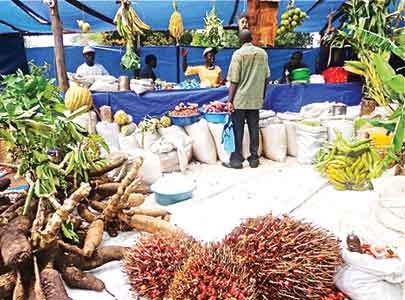- BATNF Supports Farmers • Over 821m People Hungry Globally
- Ambode Restates Commitment To Economic Diversification
- Stanbic IBTC Dedicates N50b To Support Agric
Signs of food insecurity across the world means there is considerable work to be done towards achieving the Sustainable Development Goal of Zero Hunger by 2030.New evidence signal that the number of hungry people in the world is growing, reaching 821 million in 2017 or one in every nine people, according to The State of Food Security and Nutrition in the World 2018 released recently.
According to the UN Food and Agriculture Organisation (FAO), the International Fund for Agricultural Development (IFAD), the UN Children’s Fund (UNICEF), the World Food Programme (WFP) and the World Health Organisation (WHO), to achieve a world without hunger and malnutrition in all its forms by 2030, it is imperative to accelerate and scale up actions to strengthen the resilience and adaptive capacity of food systems and people’s livelihoods in response to climate variability and extremes.
The situation is worsening in South America and most regions of Africa, calling for concerted efforts from all stakeholders in the agricultural sector to work in harmony, in order to end all forms of hunger and malnutrition now. Towards this end, the British American Tobacco Nigeria Foundation (BATNF), held the maiden edition of the Lagos Farm Fair, in collaboration with the Lagos State Government, to mark the 2018 World Food Day.
The fair, which took place at the Police Parade Ground, Police College, Ikeja GRA Lagos, is an initiative under the BATNF “Wealth Is Here” campaign, which seeks to drive access to market for farmers and provide an income generating platform to encourage Agric-business development.
It was a mini agricultural festival, as it witnessed the assemblage of farmers, across the 57 council areas, displaying agricultural produce, ranging from crops, livestock and aquaculture.Executive Director, BATNF, Abimbola Okoya said as a country, Nigeria ought not significantly affected by hunger because it is blessed with arable farmland, fertile and suitable to grow food crops, and as one of the largest producers of cassava, yam, millet, sweet potato, cashew nuts and groundnut, but a significant portion of these are either wasted or lost due to poor agricultural practices or limited access to market.
“The scale of rudimentary method of farming, makes it difficult for these farmers to access credit facilities to upscale their production or compete in the modern food value chain. With poor access to infrastructure, inputs and markets, they are one of the most vulnerable groups in the value chain.
“Hunger and malnutrition is not limited to the quality of food produced. People living with food insecurity lack a stable, reliable means of getting meals they need. This is often because of a loss of income. A business opportunity exists for smallholder farmers to raise their incomes by moving from subsistence to commercial agriculture, but they face several constraints,” she said.
Okoya noted that the fair was to provide a platform to expose farmers to opportunities in the city without financial burden or risks, adding that it will help the public access fresh and organic farm produce, and encourage farmers to switch from low quality bulk produce to high-value agricultural produce.
She disclosed that since inception in 2002, BATNF has supported the Federal and State Governments in agricultural development programmes and has invested about N1.5b in supporting rural smallholder farmers in the production of food crops, like cassava, rice and maize; and in aquaculture and livestock.
“So far, we have reached over 36,000 farmers and by 2022, our target is to have supported 62,000 rural farmers.” Human Resources Director, British American Tobacco, Nigeria, Temitope Akinsanya said the company recognises the fact that 64 per cent of the populace lives in rural communities and it’s committed to continuous funding of the Foundation to deliver on its mandate to support sustainable agriculture and improve the livelihood of those living in rural communities.
The Governor of Lagos State, Mr. Akinwunmi Ambode, who was represented by the Secretary to the State Government, Mr. Tunji Bello restated the state’s commitment to economic diversification towards boosting the agricultural sector.
He said: “I wish to emphasise that the Lagos State government through the Ministry of Agriculture has developed initiatives aimed at addressing the need of diversifying the economy, the recent breakthrough in rice-agribusiness considering the collaboration between Lagos and Kebbi States on large production, processing and distribution of the LAKE Rice product has created a land-mark in economic diversification,” he said.











